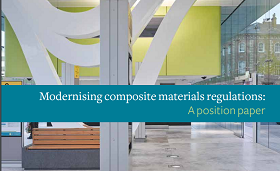Modernising composite materials regulations
In April 2017, a report was published calling for industry and government to work together to tackle the constraints on the use of composite materials in construction and offshore engineering.
‘Modernising composite materials regulations’, published by the University of Southampton, claims that inappropriate standards and regulations are holding back an approach that could be worth £4bn by 2030 if ‘barriers to innovation’ were removed'.
The first-of-its-kind study was carried out by a multi-disciplinary team from the University of Southampton, and its findings are supported by a number of leading organisations, including the Composites Leadership Forum and Composites UK.
The report recognises that the UK is a global leader in the research and development of composite materials and structures, but points out that bringing new products to market could be made much easier.
It proposes modernising the current regulations to enable industry to migrate from current systems of assurance, based on material ‘equivalence’, to a performance-based system. This would harmonise the regulatory regime for composite materials across all sectors, and galvanize manufacturing in the UK.
The global market for composite products was $68bn in 2013 and this is predicted to grow to $105bn by 2030. The UK’s current market share is £2bn.
Professor Ole Thybo Thomsen, head of the infrastructure research group at Southampton and co-author of the position paper, said:
“Advanced polymer composite materials have a huge potential to shape the modern world. The use of composites in aerospace and automobile design is now the norm, but they have much broader potential for use in other sectors such as in building and bridge construction, railway and rail infrastructure, as well as marine and offshore. In aerospace alone, 52% by weight of the latest generation of aircraft are now composed of composite materials.”
Professor Simon Quinn, director of the university’s Research Institute for Industry (RiFi) and the lead researcher of the paper, said:
“In the UK there is currently very limited coordination and centralisation of the codes and standards data associated with new composite materials. There is neither a coherent development of certified testing facilities, nor a formal process for different sectors to share information and best practice. These factors have reduced productivity, discouraged research and development and innovation, and significantly increased the time to market for new composite products.”
To download the executive summary of the report, go here.
[edit] Find out more
[edit] Related articles on Designing Buildings Wiki
Featured articles and news
The need for a National construction careers campaign
Highlighted by CIOB to cut unemployment, reduce skills gap and deliver on housing and infrastructure ambitions.
AI-Driven automation; reducing time, enhancing compliance
Sustainability; not just compliance but rethinking design, material selection, and the supply chains to support them.
Climate Resilience and Adaptation In the Built Environment
New CIOB Technical Information Sheet by Colin Booth, Professor of Smart and Sustainable Infrastructure.
Turning Enquiries into Profitable Construction Projects
Founder of Develop Coaching and author of Building Your Future; Greg Wilkes shares his insights.
IHBC Signpost: Poetry from concrete
Scotland’s fascinating historic concrete and brutalist architecture with the Engine Shed.
Demonstrating that apprenticeships work for business, people and Scotland’s economy.
Scottish parents prioritise construction and apprenticeships
CIOB data released for Scottish Apprenticeship Week shows construction as top potential career path.
From a Green to a White Paper and the proposal of a General Safety Requirement for construction products.
Creativity, conservation and craft at Barley Studio. Book review.
The challenge as PFI agreements come to an end
How construction deals with inherited assets built under long-term contracts.
Skills plan for engineering and building services
Comprehensive industry report highlights persistent skills challenges across the sector.
Choosing the right design team for a D&B Contract
An architect explains the nature and needs of working within this common procurement route.
Statement from the Interim Chief Construction Advisor
Thouria Istephan; Architect and inquiry panel member outlines ongoing work, priorities and next steps.
The 2025 draft NPPF in brief with indicative responses
Local verses National and suitable verses sustainable: Consultation open for just over one week.
Increased vigilance on VAT Domestic Reverse Charge
HMRC bearing down with increasing force on construction consultant says.
Call for greater recognition of professional standards
Chartered bodies representing more than 1.5 million individuals have written to the UK Government.






















